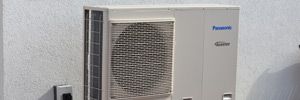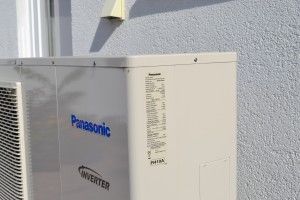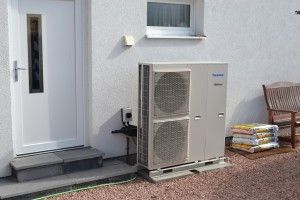

In April 2014, the government placed a £650,000 fund into the Renewable Heat Incentive (RHI). Already, almost 25,000 households across the UK have applied and started to benefit from the RHI. Thanks to the install of Panasonic’s reliable Aquarea 12kW Mono Bloc system, one family in Fife, Scotland, is now saving over £2,300 on annual heating costs.
Based in the small village of Balmullo, in Fife, Scotland, an off-grid, medium-sized property relied on an old air source heat pump (ASHP) for an entire family’s heating and hot water requirements. This home had originally had all building materials imported from across Europe, in hope of producing the most energy efficient and sustainable home in the area. However, a combination of an old heating system, poor installation and product inefficiency, meant the homeowner had previously spent a costly £3,500 per year in running costs alone. This was reduced to £1,179 once Panasonics ASHP had been installed.
The family wanted a system, which was both energy efficient and environmentally friendly, enhancing their eco-home which had been built with a view of saving money and reducing their carbon footprint. It was also important for the client to make use of available government grants, such as the RHI. Therefore, heating technology needed to be eligible and Microgeneration Certification Scheme (MCS) accredited.
Local Panasonic Pro Partner and expert in renewable technologies, Eco Heat Renewables, chose Panasonic to facilitate the process of the RHI, supplying a ‘next generation’, sustainable and MCS Accredited Aquarea ASHP. This environmentally friendly domestic heating system offered a substantially improved performance in comparison to the previous system.
After a site survey was carried out and detailed heat loss calculations were completed, Panasonic’s high performance 12kW Aquarea Mono Bloc (single phase heat pump) was selected to meet the demand of the property.

Panasonic’s Aquarea range of ASHPs deliver tangible results for homeowners thanks to its quick payback in purchase and installation costs, along with enduring savings in energy and heating bills. Meanwhile, the Aquarea is popular with installers due to its ease of installation and maintenance. Additionally, Panasonic’s Aquarea Mono Bloc adapts well in an existing installation with a boiler backup, and in new applications with underfloor heating, low temperature radiators or even fan-coil heaters. This range holds many energy saving qualities such as an optional smartphone control for better heating and cooling management, and the ability to produce up to four times the amount of energy per kW consumed in comparison to conventional heating methods. For these reasons, Panasonic’s 12kW MonoBloc Aquarea system was the clear choice for all heating and hot water requirements for this property.
Jim Russell, company director at Eco Heat Renewables, said: “Our client wanted a Panasonic heat pump as it felt that this was a strong, globally recognised brand, renowned for innovation, ease of use and reliability. It also wanted the system to be installed by a local company that was recognised as a Panasonic Pro Partner.
“We installed Panasonic’s Monobloc unit in June 2014. Feedback from the customer has been extremely positive and the family is delighted with the savings that were made immediately upon installation, and then continued in the following year.”
Within six weeks of the installation, the homeowner started to receive payments of £850 annually from the RHI. This would then continue for a period of seven years. In total, the £6,000 received from the RHI payments will cover 70% of the total install cost by itself.
As a result, Eco Heat Renewables successfully matched the clients brief and expectations. The family has lowered its original, daily running costs from £10 per day to just under £4, making savings of a massive 65% (£2,300 per year) and there has also been a substantial decline in carbon emissions.
